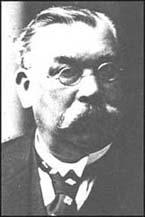John Hodge

John Hodge, the son of a puddler at the local iron works, was born in Linkeyburn, Ayrshire, on 29th October 1855. His father, William Hodge, was active in trade union activities and as a result of being victimized, was unable to find work in the area. Hodge moved his family to Glasgow and John attended the Hutcheson's Boys' Grammar School.
At the age of thirteen Hodge left school and became a solicitor's clerk. He also worked in a grocer's shop before settling down in the same trade as his father. Hodge worked in Coatbridge and Motherwell and it was not until he was nearly thirty that he became involved in trade union activities.
In 1885 Hodge and his fellow workers at Colville Works in Motherwell, were told they had to accept a 20% wage reduction. The workers responded by forming the British Steel Smelters' Association (BSSA), and elected Hodge as their secretary. Although there was a National Amalgamated Association of Ironworkers in existence, the union had no members in Scotland.
The growth of Hodge's union was rapid and by the summer of 1886 virtually every smelter in Scotland had joined. Hodge now began recruiting workers from England and Wales and by 1888 the union had 750 members and had joined the Trade Union Congress. With so many members Hodge was in a good position to negotiate good wage increases with large firms such as the Steel Company of Scotland. The BSSA was rarely involved in costly industrial disputes and Hodge's considerable success at persuading employers to accept his demands encouraged more men to join the union. The BSSA was particularly strong in Lancashire, Lincolnshire and the Midlands.
Hodge also had ambitions to enter the House of Commons. He failed several times as a Liberal but in 1906 General Election he won at Gorton, Manchester, for the Labour Party. In Parliament he was mainly concerned with trade union issues but at the outbreak of the First World War he took a strongly patriotic position and derided Labour Party leaders such as James Keir Hardie and Ramsay MacDonald that called for a negotiated peace. Hodge was also a sharp critic of those unions that went on strike during the war.
When David Lloyd George replaced Herbert Asquith as Prime Minister in 1916, Hodge was appointed as Minister of Labour in the new government. Hodge was a useful acquisition as he was now arguing that any industrial action in wartime was equal to treason. When a group of Liverpool boilermakers went on strike, Hodge sent them a telegraph warning them he intended charging them under the Defence of the Realm Act. The threat succeeded and the men went back to work.
Although a member of the Cabinet, John Hodge retained his position as leader of the BSSA. With a membership of 36,000, the union moved its head office from Glasgow to London. Other unions is the steel and iron industry had complained for years about Hodge poaching their members but in 1916 they accepted defeat and agreed to form the British Iron, Steel & Kindred Trades Association. Hodge was elected president of this new union.
The Labour Party in Gorton was unhappy with the way Hodge had behaved in government and in the 1918 General Election selected another candidate to represent the constituency. Hodge now used his negotiating skills to persuade the constituency party to change its mind in return for promises made about future behaviour. The Conservative Party, declined to put up a candidate against Hodge so he was returned by a large majority.
Although Hodge was also elected in the 1922 General Election his attendance in the House of Commons after the First World War was poor and he rarely spoke in debates. He retired from Parliament at the 1923 General Election but retained his position as president of the Iron & Steel Trades Confederation.
Hodge upset many trade unionists by refusing to support the 1926 General Strike and after coming under considerable pressure from union members, finally resigned in 1931.
John Hodge died at Bexhill on 10th August 1937.
